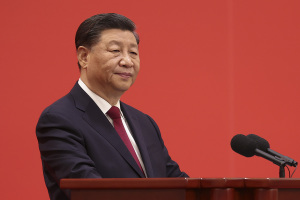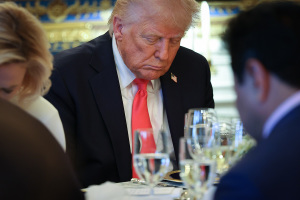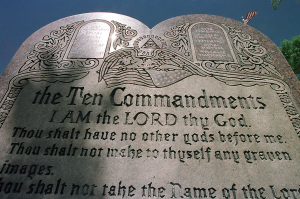Obama, GOP Wrangle Over Jobs Speech Timing
A kerfuffle between President Obama and Republicans over the scheduling of Obama's address to Congress on jobs reminded Americans once again that both parties are finding it challenging to work together.
Obama and the White House initially scheduled the speech at the same time as a Republican presidential debate, but after much complaining from both Republicans and Democrats, accepted Speaker of the House John Boehner's (R-Ohio) suggestion that it be rescheduled for the next night.
Many viewed this scheduling request as an attempt to take attention away from the Republican candidates, much in the same way that Texas Governor Rick Perry announced his plans to declare for the Republican presidential nod the day of the previous Republican debate, and announced his candidacy the day of the Iowa Caucus.
White House Press Secretary Jay Carney denied these accusations, saying, “It is coincidental. There are a lot of factors that go into scheduling a joint session of Congress for a speech. You can never find a perfect time.”
Though Carney said those words with a straight face, few pundits from both sides of the political spectrum believed them.
“Come on. The White House may have thought it was clever to step on the GOP’s message. Instead it clumsily tripped over its own cuteness,” liberal Washington Post columnist Ruth Marcus wrote.
One of the “factors that go into scheduling a joint session of Congress for a speech” that Carney spoke about is clearing the schedule with the Speaker of the House. The White House claims they contacted a Boehner staffer before making the announcement, but Boehner's office claimed that Boehner never signed off on the date.
“No one in the Speaker’s office – not the Speaker, not any staff – signed off on the date the White House announced today,” said Brendan Buck, a Boehner spokesman. “Unfortunately we weren’t even asked if that date worked for the House. Shortly before it arrived this morning, we were simply informed that a letter was coming. It’s unfortunate the White House ignored decades – if not centuries – of the protocol of working out a mutually agreeable date and time before making any public announcement.”
Late on Wednesday, Boehner sent a letter to President Obama asking him to move the date to Sept. 8. Sept. 7 is the first day that Congress will be back in session after the August recess and votes were scheduled for 6:30 p.m. that evening, Boehner said in his letter.
“With the significant amount of time – typically more than three hours – that is required to allow for a security sweep of the House Chamber before receiving a President, it is my recommendation that your address be held on the following evening, when we can ensure there will be no parliamentary or logistical impediments that might detract from your remarks,” Boehner wrote.
Much like the White House announcement, few pundits, from the left or the right, believed that Boehner's suggestion really had to do with the need for a “security sweep.”
Sept. 8 is also the day of the first NFL game of the season, when the Seattle Seahawks will face the national champion Green Bay Packers. This left many wondering if Boehner suggested Sept. 8 because the football game would diminish Obama's audience.
Obama, nonetheless, relented and agreed to a Sept. 8 speech date.
“There are no coincidences in presidential politics,” The Washington Post's Chris Cillizza wrote. “It’s clear that this White House saw an opportunity to drive a major-and direct-contrast between President Obama and his potential Republican rivals and took it.”
As Obama's strategy became obvious, some Democrats began to question whether it was even a good strategy to begin with. Two senior Democratic strategists, speaking anonymously to Cillizza, said it was a bad move because it would have focused attention on the strategy, rather than substance, of the speech, and would have failed to provide Americans an opportunity to view the alternatives between Obama and the GOP candidates.
Marcus was also critical of Boehner's response. “The president started the fight and therefore gets the greater share of blame for it, but [Boehner's] decision to reschedule left Republicans looking small,” Marcus wrote.
The Washington Post's James Downie also expressed disappointment in the White House, noting that Obama spends a lot of resources trying to appear as someone “above” partisan politics, then attempts a “blatantly partisan stunt.”
“If this was an attempt to make Republicans look unreasonable, then, in almost every conceivable way, it failed spectacularly,” Downie wrote. “And scheduling the speech during the GOP debate, even if Boehner had immediately acceded, is the one way the White House could guarantee a) that fewer voters would be watching and that b) viewers and pundits would pay less attention to the speech’s content and more to the theatrics around it. In other words, it’s the easiest way to lessen the speech’s chances at success. If this is a preview of Obama’s re-election campaign, Democrats should be very worried.”
Obama-Boehner “theatrics” were also on display during the debate over raising the nation's debt ceiling. Obama and Boehner had been working together behind closed doors on a “Grand Bargain” to raise the debt ceiling. Boehner twice walked away from those negotiations, leading Obama to complain in a press conference that he had been “left at the altar” by Boehner.
Marcus observed that the controversy over the, normally routine, scheduling of a presidential speech illustrates, for many Americans, the continued dysfunction of the current administration and Congress.
“If [Obama and Boehner] had gotten together to figure out how to make Americans think even less of Washington politicians, they couldn’t have done much better,” Marcus wrote.



























